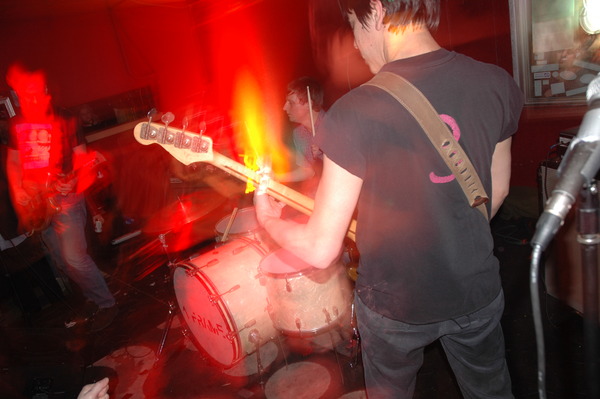A Frames
If, as the Carter Family song goes, it takes a worried man to sing a worried song, does it follow that it takes a paranoid man to sing a paranoid song? As you listen to Black Forest, the A Frames’ third record and their first for Sub Pop, you’re left to reckon so. “Worried Man Blues,” a traditional folk song first recorded in 1930 by the country/bluegrass pioneers, is about a man waking up with shackles on his feet: “twenty-nine links of chain around his legs,” while this record’s title track tells about the steady-but-sudden jolt of de-evolution: “no organism left to grow/Black Forest and fall-out snow.” The Carter Family recording became a standard on Depression-era radio; A Frames songs afflict the art-minded online forum hounds of the Over-Information Age” which, I’m sure we can all agree, is starting to look more and more like the Depression every day. That such an admittedly odd association can be made so aptly drawn across an expanse of time and place serves to cement the idea that the A Frames are timeless. While referencing the darkest days of the past, they are miles in front of the future.
As much sense as it makes to construct an analogy between Dust Bowl pioneers and Digital Age dissidents, however, the highly singular sound of the A Frames is best understood through, well, its own frame. Having each cut their musical teeth many years prior on bands like Cows, Butthole Surfers, and Scratch Acid, the three-piece formed in Seattle during the late ‘90s and began collectively designing their own brand of stripped-down neo-modern experimental noise. Beginning with the band’s 2002 lo-fi/post-punk self-titled debut (released in tandem by S-S Records and Dragnet, the band’s own micro-label), the A Frames have issued songs about apocalyptic cultural shifts and surveillance strategies. Erin Sullivan’s angular, angry guitars and bleak, deadpan lyrics march over Lars Finberg’s robotic trashcan beats and Min Yee’s stirring, sexy low end. The band’s early singles were junky, fast-and-dirty missives about radiation and test tube babies; by the time A Frames 2 was released the following year, much of the junk had progressed into bare, contrasting lines of skewed melody and dark pop tones, and the dirt had become sterilized bacterium.
With Black Forest, they continue to engage thick, rich chords of chaos to illustrate ideas about the commonalities of existence. Though more textural and complex, the third record retains the rawness of the first. “Galena” and “Experiment” draw from the mundane language of data testing and earth sciences as the music underneath mimics precise incisions made by leaden, ponderous machinery. “Beloved Teacher,” on the other hand, utilizes translated Cold War-era Moldovan/Russian texts and layers upon layers of disembodied voices. A Frames are the only known entity to take from the minimalist, hypnotic droning of Kraftwerk and Amon Duul without sounding synthesized or fey, and from the ’70s garage rumble of bands like the Scientists and the Cramps without sounding like a rock and roll band at all.
Recorded and produced by the band, S-S Records head Scott Soriano, and Sacramento’s stun gun-toting boy genius Chris Woodhouse, Black Forest is a cold, sterilized cacophony that illustrates meltdowns, laser love, and greed. The A Frames make analog anachronistic dance hits and post-modern blues ballads for binary code casualties. They are worried, paranoid men and this is their song.













